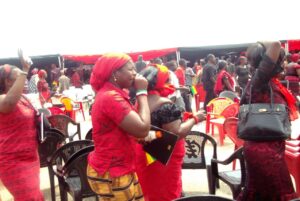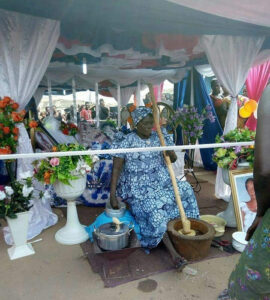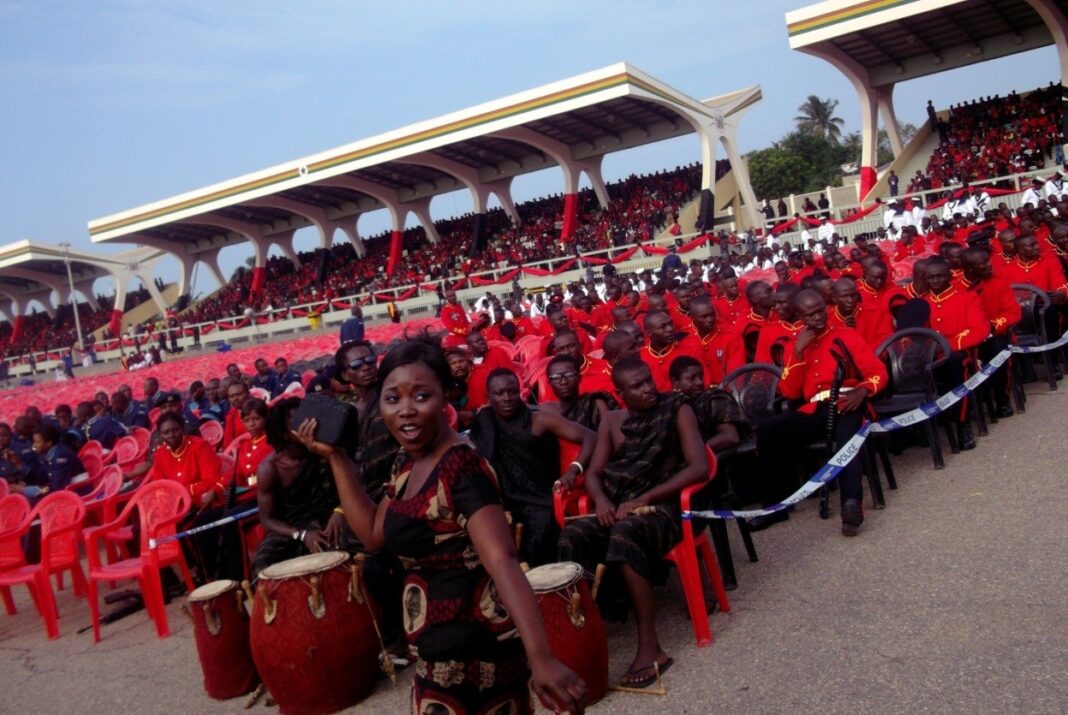One worrying spectacle creeping into the social fabric of the Ghanaian society these days is the way funerals are becoming competitive festivals at which wealth is lavishly displayed leaving huge debts on the heads of the bereaved families. It is a common phenomenon from a tribal approach to see how the dead is buried in Ghana.
Interestingly, funerals have become a time for both mourning and celebration of life. I am wondering whether funeral rites were times for mourning or rejoicing. Funerals have always been the main public social attraction among Ghanaians but the growing funeral business significantly alters the way death is celebrated.
The crave by Ghanaians to organise lavish funeral ceremonies, has always surfaced for public debate. In most Tribes, funeral events are held each week. These go with lavish spending on ambulances, food, drinks, and the hiring of loud speakers; expensive clothes of different kinds are also displayed at the funerals to show off as some also take advantage of the funeral to steal and involve themselves in immoral activities such as dating and romance.
Every Saturday is a funeral day. In every mid-sized town there are two or more funerals. Hundreds of people come together to pay their last respects to a deceased loved one or to sympathize with a bereaved friend. People dress up and travel to attend a funeral in another town or village. In turn, they expect the bereaved family to entertain them with music, dance, drinks, and sometimes food.

In the evening, it can be hard to find transport back to town, when trotro (minibuses for public transport) are filled with funeral guests going home. And every Saturday evening people dressed in black and red funeral cloth flock together to end the day’s funeral by dancing to the tunes of highlife music. Funerals are at the heart of Ghanaian culture and social life.
One could expect a traditional ritual, centred around the extended family and on beliefs about death and ancestorship, to reduce in importance under the influence of individualization, urbanisation, the market economy, and Christianity. The opposite scenario is taking place in Ghana. Funerals are, more than any other ceremony, increasingly gaining in scale and importance.
It is almost universally acknowledged that Ghanaians adore the dead and will commit so much to performing expensive and flamboyant funeral rites. This practice is as old as the earliest history Books and contemporary as the morning newspapers.
The dimension which contemporary Ghanaian funerals have assumed over the last two decades give a great cause for concern if not worry. Whilst in other parts of the world people are busily working hard sometimes seven days a week, some people in Ghana spend time on the non-essentials- celebrating one week of the dead, final funeral rites and even forty-day celebration of the dead.
Huge Expenditure on Funerals
Surprisingly, a number of our politicians attend funerals almost every weekend. Consciously or unconsciously, some Ghanaians seem to measure the efficiency of a Minister or Member of Parliament by the number of funerals he or she attends every weekend and the donations he or she makes to the bereaved families.
Without any reservation, I must state from the onset that, Ghanaians spend more money on funerals than on weddings. One cannot imagine that some tribes and families spend as much as between GH¢50,000 and GH¢100,000 on funerals. Any time you travel along the highway, you will see people clad in black, brown, and burgundy colours in every town, village and hamlet. These are the traditional mourning clothes by Ghanaians when someone commits suicide, dies in battle or is shot dead in any way. There are occasions when some wear white when someone lives to a ripe old age.
Usually, when a person dies, the immediate relatives in the town or village are summoned to a meeting where they are informed of the passing. In modern times, with the advent of refrigeration, bodies are deposited in the mortuary if the person died at home, or if in the hospital, that is automatic. An autopsy will be performed. After that, the family may leave the body in the mortuary for so long as they have money to pay for the mortuary fees.
In the interim, messages will be sent to all relatives far and near. If there are children and siblings outside the country, they will be informed. A week after the death, the family will gather to celebrate; this is the time when they will decide on burial arrangements.
Depending on where children and siblings are, the burial may take place in a short time or they will wait for those outside to return to the country. If outside relatives are returning, then it may take a longer time. When the date is set, usually the ancestral family home will be painted anew. Everything will be spruced up to impress visiting mourners.
Forms of Burials and Caskets
Burials normally take place towards the weekend. On the day before the burial, the body will be retrieved from the mortuary and brought to the family house. Special family women who are versed in handling dead bodies, popularly called undertakers, will do the bathing and preparation. The body will be laid in state and family members will keep vigil over it. Visitors will file past it and stay for a period.

The coffins that are manufactured are brightly colored, elaborate and festive. Often called “fantasy coffins”, depicting the life of deceased. Coffins are created in the form of fish, animals, cars, bottles, Bibles, and any other object requested. A fisherman may get a fish coffin; a carpenter, a hammer; or a photographer, a camera. Someone devout may choose a Bible.
This different posture of laying corpse is very disturbing to the extent that it has now become a fashion. Some are laid to indicate the kind of work they did before their death, including standing with a hand on sewing machine to indicate that the person was a seamstress or tailor.
Some are laid to stand beside a table, holding tools of a carpenter; sit down near an old gear box indicating that the deceased was a mechanic; sit on a chair holding an impoverished steering wheel, indicating that that he was a driver before death; holding a pestle pounding fufu indicating the deceased was a “chop bar” operator. According to Rev. Fr. Francis Homatekpor of the Catholic Diocese of Ho in Ghana’s Volta Region in articles published in The Catholic Standard many years ago, the new phenomenon of laying corpses, is only subjecting the dead person to further agony, because someone who passes away is sleeping in the Lord.

With the advent of Christianity, Church services have been added. The burial may take place on a Friday or Saturday. The body will be taken to a Church for the funeral Mass. After which it will be interred at a cemetery. Upon return, the family will gather in front of the family house or on a soccer field to hold the funeral celebrations. Here, guests will be served with drinks and food, music will be played, and people will dance to celebrate the life of the deceased. There will be special tables set aside where people will make financial donations to the family to help defray the cost of the funeral.
On the Sunday, if they are Christians, they will go to Church for a thanksgiving and memorial service. After service, the family members and visitors will gather at a hall where they will be treated to some tasty meals. At the end of that, those who travelled from afar will ask permission to leave.
A few years back, we never heard of ‘take away’ packages at funerals but now they are very much in vogue and if one does not include it in funeral expenditure, it is as if one is looked down upon. Should funerals be a time to display one’s opulence and pedigree and must we follow others if we cannot afford?
Forty days later, the family will gather for the forty day celebration. Research has shown that some Ghanaians used to have the ninety day celebration but that is currently out of style. A year later, the first anniversary is celebrated.

Before funerals are held, it is a common sight along the major roads to be hit by huge colourful billboards advertising funeral arrangements. These billboards which are also expensive, range from GH¢5,000 to GH¢20,000 depending on the size. Of late in Ghana, these billboards are gradually surfacing on the skyline of the nation’s capital, Accra where huge billboards are erected at strategic locations announcing funeral arrangements. They are so conspicuous that everyone who uses that particular route sees it.
The multi-million question asked by people is that, is it that those billboards denote affluence, class, ostentatious living or otherwise? Enquiries had revealed that especially in Accra, it is believed that families that put up such funeral billboards might have relations who work in an advertising agency, who freely donate these billboards to serve as a forceful reminder to relations, friends and well-wishers, than other forms of advertisements such as invitation cards which can be easily misplaced.
Based on the lavish spending by Ghanaians on funerals, I personally think we have to change certain habits and lifestyle to move the nation forward in the right direction. Obviously, too much time, energy and resources are spent in organizing and celebrating funerals. As stated above, dead bodies are left for long period in the morgue to enable families to mobilize resources for an eventual ‘big time’ and expensive burial.
Apart from expensive coffins, bereaved families go in for expensive clothing at times two different types to show off at such funerals. Some go to the extent of hiring bands to make the occasion glamorous. But unfortunately, some of the dead on whom much is spent were not given proper attention and care when they were alive. The notion one gets from such selfish display of affluence is that Ghanaians now honour or prefer the dead than the living.
In a debate on the floor of Parliament in 2007, Mr. Alban Bagbin, then Minority Leader and currently the Speaker of Parliament, is reported to have said, “We are investing in the dead rather than the living through expensive funerals and that is bad”. He added that the dead should be given decent and not expensive burials knowing very well that whatever was done to the dead was destined for the grave.
On the same issue, Mr. Alfred Agbesi, a former Member of Parliament for Ashaiman at the time, called for the introduction of one cloth for all funerals, arguing among other things that, “after spending on expensive cloths, coffins and keeping the corpse in expensive morgues, the widow and children are left with nothing and are expected to fend for themselves.”

Must we fritter away money on funerals if we cannot afford to do so only to discover that we have plunged the family into debt while the money used could have been spent on education of the children of the deceased?
One interesting observation is that many women spend lavishly on funerals to the detriment of the welfare of their children. Most Rev. Gabriel Charles Palmer-Buckle, Archbishop of Cape Coast, has over the years and even now, spoken against expensive funerals and had rather encouraged Ghanaians to set up Endowment Funds for their dead relatives to immortalize them instead of spending extravagantly during their funerals.
“The surest way to remember the dead is not the type of coffins used to bury them nor the type of cloth or ‘T’ shirt won during their funerals but doing something positive for the dead which would benefit the living”, the Archbishop noted. This clarion appeal to wealthy families to set up Endowment Funds will indeed serve as a more lasting monument to the dead as their poor relatives could receive bursaries to further or complete their education.
In the 2014 Pastoral Guidelines of the Second National Pastoral Congress held from August 5 to 12, 2014 at Sunyani, released to Catholics in Ghana, the Ghana Catholic Bishops’ Conference stated clearly that “As a Church that opts for the poor, we strongly condemn extravagant celebrations, especially funerals, weddings, etc. In this vein, we recommend that funeral and burial ceremonies should always be performed within a short period after the demise of the person.”
The Ghana Catholic Bishops’ Conference (GCBC) in its Communiqué in 1997 decried the huge sums of money spent on funerals, stating, “While we encourage respect for the dead, we appeal to Ghanaians to exercise moderation with regard to funeral expenditure and rather use the money on living relatives.”
In 2018 during the funeral of Sir J.H. Mensah, former Senior Minister, the Archbishop of the Cape Coast Catholic Archdiocese, the Most Rev. Charles Gabriel Palmer-Buckle, appealed to Ghanaians to desist from wasting precious time and resources on funerals at the expense of the poor and needy.
He commended the government and the family of the late J.H. Mensah for organising a state funeral within 40 days, describing the move as a good example to Ghanaians who were caught up in the phenomenon of wasting resources on one-week observance of funerals.
At the funeral, Archbishop Palmer-Buckle counselled the public against keeping their dead family members in the morgue for a very long time and afterwards spending huge sums of money and resources, including precious time, to organise one-week rites and funerals.
He said another disturbing situation was where people usually left their work to attend funerals and one-week rites of the dead, using state resources and proposed that instead of wasting resources on such rites and funerals, the public should spend their time and money on the living.
Conclusion
Ghana has no doubt been cited as a classical example of committing so much to funerals to the extent that some take loans for funerals just to give an impression of affluence whilst leaving bereaved families with mountains of debt.
Inasmuch as one would not be against the dead being accorded a befitting burial, many concerns lie in the way some bereaved families go about the funerals. However, it should be the utmost responsibility of Ghanaians to take care of the aged, keeping in mind that one day they would also need the same care in their old age.
In Ghana, now, it is a well-noted prevalent attitude of people not to take care of the aged but spend huge sums of money on elaborate funerals for the very people they were supposed to cater for during their lifetime. From the youngest to the oldest ones, we are all ordained by God to give a helping hand to people especially the poor and the disadvantaged to make life comfortable for them.
Every Ghanaian knows that funerals are performed to bid farewell to the departed ones, but do not know that it costs the nation many man-hours and low labour productivity as many workers leave on Fridays for funerals and perhaps return Monday afternoon or Tuesday morning resulting in the dismissal of some of them.

Some progressive Churches and religious organizations have banned wake keepings, sale and serving of alcoholic drinks and buying of new cloths for every new funeral just to cut down cost. We must always have it at the back of our minds that whatever we spend in heightening the burial of a deceased relative cannot revive him to life. He cannot return to life and it is therefore a waste on the so-called befitting burial.
The time has come for Ghanaians to reduce funeral expenses and leave enough money for orphans, widows, widowers and other members of bereaved families. It is never too late for Chiefs, opinion leaders, Churches and Religious Organizations and other influential people in society, to intensify their call to Ghanaians to reduce funeral bills.
Ghanaians must take a cue from the words of a former Director-General of the Ghana Health Service, Professor Agyeman Badu Akosa that we should pay more attention to healthy living and give priority to our health instead of spending all our resources on expensive funerals.



